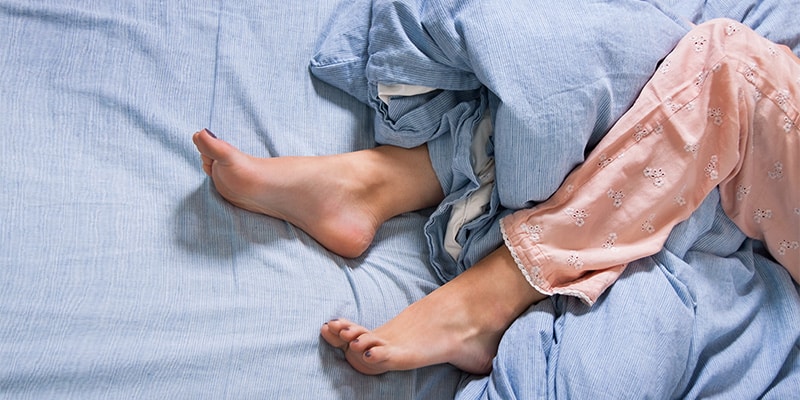Do you or your partner thrash, tingle or twitch before or during sleep?
For some people, lying down to go to sleep might as well be setting off on a brisk midnight hike. Feet will kick, legs will “crawl,” or the whole body may suddenly jerk. Sometimes even the arms are affected.
If it’s mild and occasional and doesn’t impede your sleep, a little bedtime body restlessness is nothing to worry about. But for many people, symptoms such as these can be frustrating.
Depending on cause and degree, they may also carry real health risks—heart problems from increased blood pressure, not to mention insomnia, frequent awakenings and restless sleep.
So if you’re regularly troubled by creepy-crawly limbs or strange body movements at night, it’s important to check with your doctor. A correct diagnosis matters, and there are treatments and lifestyle changes that can help.
Here’s a quick overview of some—but not all—possible causes.
1. Restless Legs Syndrome
An occasional urge to move your legs is normal. But if you feel a repeated, intolerable sensation in your legs of creeping, crawling, tingling or burning that is only—and only temporarily—relieved by moving them, that might be Restless Legs Syndrome, or RLS.
The incidence of RLS is as hard to pin down as those twitchy legs. A recent study found the syndrome in about two percent of subjects, but noted that people who take estrogen or have obstructive lung disease have greater risk. Many people who had “growing pains”—nighttime aching of the legs—in childhood have RLS as adults.
2. Periodic Limb Movement Disorder
A companion to RLS in 80% of RLS cases, periodic limb movement disorder (PLMD) refers to involuntary movements—often described by bed partners as jerking—of the limbs during sleep.
The sleeper may be unaware that legs or arms are flailing, but will awaken frequently during the night and seldom feel rested or restored in the morning.
Daytime fatigue or sleepiness are common effects of PLMD, which also occurs in over 35% of people aged 65 and older.
3. Myoclonus
Myoclonus, or myoclonic jerk, is the term for brief, involuntary twitches of a muscle or group of muscles. It’s called a “hypnic jerk” when it happens as you fall asleep.
What’s distinct about this kind of movement is that not only is the sudden jerk involuntary, but it’s often followed by a disturbing sensation of free-falling through space. Some scientists speculate that in evolutionary terms, it might be related to when early humans slept in trees to be safe from predators—the jerk would awaken them in time to avoid falling.
Another form is the ordinary hiccup. Myoclonic jerks are often normal, but in some cases may be cues to certain neurological disorders, including Parkinson’s disease, Alzheimer’s disease, or multiple sclerosis (MS). They can also result from some kinds of injury to the spine.
4. Iron deficiency anemia
When iron levels become too low, often RLS symptoms will appear. It’s critical not to just start popping iron supplements, however—too much iron is dangerous. Iron overload can increase your risks of heart disease and cancer.
A healthy range of iron, or serum ferritin, lies between 20 and 80 ng/ml (nanograms per milliliter). Below 20, you are iron deficient, and above 80, you have an iron surplus. The only way to know is to ask your doctor to test your blood for serum ferritin levels, and follow recommendations carefully.
It’s not a DIY
Because sometimes they’re simple and sometimes complex, finding out what issues underlie your nighttime movements should not be an occasion for self-diagnosis.
See your doctor and describe the symptoms you have in as much detail as you can. Keeping a sleep log for a week or two before your appointment can be helpful, too—take it along to give your doctor the clearest picture possible.
A range of solutions
Your doctor may recommend a sleep study for a detailed analysis of what’s happening in your body and your brain. (You spend the night in the study facility and sleep with some electrodes taped to your head and an oxygen sensor on a fingertip.)
Bear in mind that in some cases, lifestyle solutions might reduce your symptoms enough that medication or more complicated treatments won’t be necessary.
Exercising regularly, losing excess weight, avoiding caffeine and alcohol in the evening, and reducing stress are among the choices you can make to sleep more soundly—and hopefully, do the hiking in your dreams.
While you’re at it, consider whether a customized natural mattress might also be a valuable good-sleep aid. Sometimes the perfect level of support or cushioning—or both—can make a big difference in the quality of your sleep. It won’t cure medical problems, but being truly comfortable is always a bonus for your rest.
